Home | City Notes | Restaurant Guide | Galleries | Site Map | Search | Contact
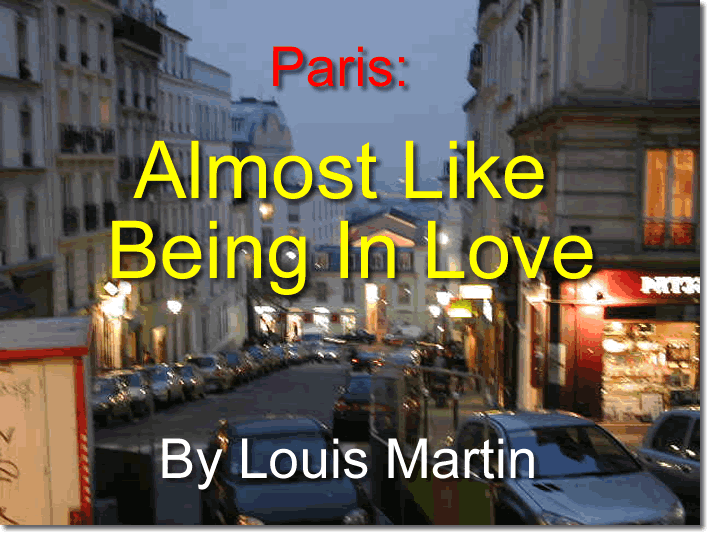
I get a lift across the border from Puigcerda to the train station at Latour de Carol. I'm catching the 8:30 evening run to Paris. When I get in the car, it is almost empty.
On a previous trip to Paris I was hoping to find the jazz clubs around Montmartre and Pegalle but failed to do so. I had only a few hours then and my taxi driver did not know the area. She only knew that Pegalle was where all the sex clubs were. She dropped me off near the Moulin Rouge, warning me to be careful. The only thing I found of interest was the L'X-O! club.
But this time I had plenty of time. I was booked for three days at a hotel on Rue Lepic.
It was late March but Spring had not sprung in Paris. At 5:00 AM approaching the city I could see patches of snow along the tracks. The trees in the countryside were barren of leaves.
At 7:30 at the Austerlitz station I got a taxi to take me over to the hotel. Since check-in time was not until 2 PM, I simply dropped off my suitcase and went for a walk around town.
It was a cold morning for a walk. Paris, like San Francisco, has had an exceptionally cold Winter. I would much rather have been in bed. I headed up Rue Lepic to Rue Abbesse and turned right on Abbesse. I did not get far before I was feeling unbearably cold. I stopped at Le Sancerre, sat at a corner table by the windows facing the street, and ordered vin rouge. Slowly I began to thaw.
This was not the way I had planned to start my stay in Paris, but what could I do? I had six hours on my hands and I would make the best of it. The wine was already helping.
In Paris, or at least in Montmartre, you do not have to walk far to find something of interest. About 10 feet is usually enough. There are cafes, tobacs, bars, flower stands, wine shops, boulangeries, produce stands, art galleries everywhere. In San Francisco you have to walk a little further. Fortunately in San Francisco there are lovely views to take in while you walk, as San Francisco is build on hills. In Paris the terrain is more flat, though Montmartre, not exactly a mountain as its name would imply, is build on a considerable portion of raised earth. It reminds me somehow of the swollen belly of a pregnant woman. When she gives birth will it be to food, art, or just classy living?
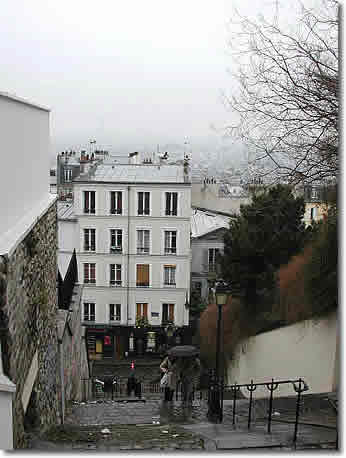
Descend from Rue Abbesse down Rue Lepic to Boulevard Clichy and you find yourself back in flat land. You also find yourself in the red light district of Paris. That is where you find what the Parisians call the "sex clubs." I don't know if I have these places down, really. In San Francisco I know them pretty well. They are called massage parlors. But they are not quite the same. In the San Francisco massage parlor there is no alcohol, as that might lead to what, lewd behavior? Troubled minds make up our laws. Instead you go in to get a massage, then once inside negotiate the sex part of it with your masseuse, who is an independent contractor. In Paris the sex clubs are more like bars with back rooms. They are a little more honest about it in Paris. Imagine how fast the massage parlors in San Francisco would be closed down if they called themselves "sex clubs." There is a lot in a name.
After warming myself at Sancerre, I decided to take a walk up the hill. Or maybe I should put it this way. I just started walking and found myself ascending the hill on Rue Tholoze. That joins up with another part of Rue Lepic—I don't know how the two parts got separated but there is probably some history there. Near the top I stopped in a gallery that seemed to be all about posters. I sensed, after a few words with the young woman working there, that it was all about tourists. I quickly exited. Nevertheless I proceed up the hill to a plaza where I was ambushed by the first "artist" working the area. This was a Mr. Giusseppe Bruno, who asked to do a sketch of me. "It will only take five minutes," he said. "If you like you pay me something."
I should have run. Instead I hesitated, looking around the plaza, and he began sketching. After a couple of minutes I said I was going to have to go.
"Just one more moment—almost fini."
"Sorry, gotta go now."
He began to sketch faster and faster. I thought his pencil was going to rip right through the paper.
"There," he said, tearing the sketch from his pad and thrusting it at me. It looked nothing like me. It looked like young Romeo with a guitar.
"Terrible, truly awful" I should have said and walked off. If I had really been on top of the situation things would have gone like this:
"Giusseppe, that is the worst piece of art I have even seen. Who gave you permission to work up here where the likes of Pablo Picasso once worked?"
"Signore," I know I can't draw—I have absolutely no talent, as you can see—but I'm in desperate need of money. Why don't you pretend, just for a moment, that I'm an artist and pay me something."
"Because, Giusseppe, that would be like the feeding of rats. You want to decrease the population of vermin, not increase it."
"You are right, signore, but you see I have a family to feed and ..."
In the end I paid Giusseppe a few euros and he rolled up the sketch for me and I walked off feeling embarrassed that others were watching me and thinking that I was extremely stupid. Had I soundly thrashed Giusseppe, I think I would have heard a chorus of applause. Around the corner, out of view, I threw his sketch into the first trash container I saw.
At the top of the hill I decided, or rather intuited, that I was probably going to be happier at the lower altitudes of Montmartre. I could have paid a visit to Basilique Sacre Couer—most beautiful and holy, I'm sure—but decided to descend Montmartre instead. I headed for Boulevard Clichy and the sex clubs. Who knows, maybe I would find those elusive jazz clubs while prowling the boulevard.
There was one other thing I was interested in down there: Le Chat Noir. On my last visit to Paris I had been unable to find it.
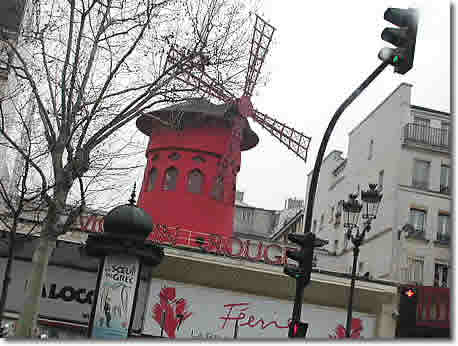
At the the Omnibus cafe across the street from the Moulin Rouge I ordered le vin rouge one more time and sat staring out the window at the bad weather, now just the weather. Whatever the weather was the weather, I was now saying to myself.
One of the nice things about sitting in Paris cafes is that you can see everything. At Enrico's Sidewalk Cafe in North Beach in San Francisco you can see nearly everything that happens on lower Broadway, though you may not want to; but Enrico's is more the exception than the rule in San Francisco. While there are other sidewalk cafes in "The City," there are not that many and they do not afford the panoramic view that a proper Parisian cafe provides. In the Paris cafe you can see everything. A long set of broad windows faces the street, which makes peripheral vision even greater. It is your duty in Paris to check out the scene, and it is the duty of the scene to be checked out by you. If this does not appeal to you, you are not going to like Paris. Also, you can sit inside where it is warm and dry; or you can sit outside, protected from the weather by a low awning that hugs you and warmed by a heater that loves you, and participate in the weather more directly.
When the waiter came by I asked if he knew where Le Chat Noir was. Instead of asking, "Ou est les toilettes?" I said something like "Savez-vous ou est Le Chat Noir?"
"Je ne sais pas," he said looking embarrassed.
He said he would ask the bartender, who looked like he was also the owner. The bartender, an older man of considerably thinned hair, came by and said it was just a couple blocks up the street on Clichy a droit. This is just want I wanted to hear. "Merci," I beamed. I paid my bill and left.
Two blocks away I found it. I had become curious about Le Chat Noir in Paris ever since Enrico Banducci told me about a place named The Black Cat in San Francisco. The Black Cat had been modeled on Le Chat Noir in Paris. In fact San Francisco has had two Black Cats, now both deceased. (Were seven more possible?) Enrico was referring to the original one down on Montgomery street before all the high rises transformed Montgomery into all business and no play. This was back in the late forties, when fun was more fun and affordable.
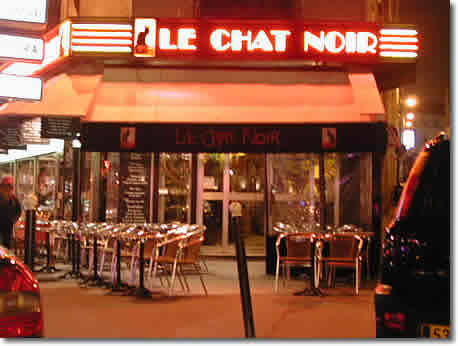
"You could get anything you wanted there," said Enrico in a most suggestive manner. What exactly you could get there that you could not get elsewhere I was not quite sure. Still it sounded wonderful.
In Paris, however, the Le Chat Noir still existed and apparently it had a long history. If I couldn't get whatever I wanted these days in San Francisco, perhaps I could still get it at Le Chat Noir. Maybe I could even get things I didn't know I wanted but desperately needed. I was hopeful.
What I did notice when I found Le Chat Noir was this: it looked much like any other pussy cat on Boulevard Clichy. It looked like a long brasserie with lots of windows and an awning and sidewalk seating. I went inside. Enrico had told me that at The Black Cat in San Francisco there was always someone at the piano. He said the smell of the place was intoxicating. In Le Chat Noir there was a piano but no one was playing. I do not remember any particular smells, which may be a good thing. In fact, the place was almost empty except for the bartender and a scruffy-looking older guy in a T-shirt who looked like he had decided not to shave that day. I looked around for things of desire or deep longing but saw none.
At the bar I inquired about "le histoire de Le Chat Noir." The bartender relayed my question to the scruffy older guy.
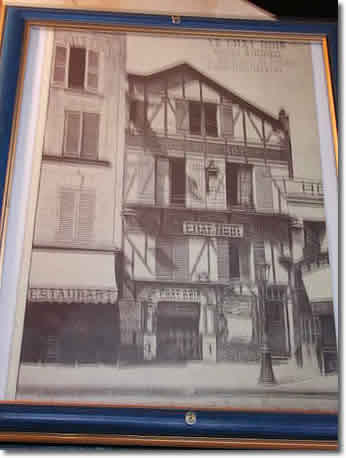
I did not determine this for a fact, but I do believe he was the current owner. He did not seem to know very much but he told me that the original Chat Noir had been demolished in 1953 and rebuild on the same location in 1955. He pointed to some photos on the wall. The old place looked like a classic cabaret. I don't know the date of the photos but they looked to be maybe around 1900. Most of the men wear hats and some have beards. The new place has a small stage for performance with an upright piano. To the right of the stage is an advertisement for Jack Daniel's. What may be historical is the restroom down below. There I found, instead of a urinal, a hole in the floor with indentations on the floor showing where to plant your feet. The entire chambre de toilette was tiled. Sad if this is all that is left. I took a pee and it had an authentic feel about it.
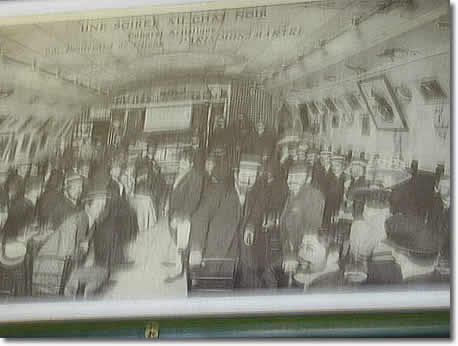
I'm not sure what all I did while killing time before checking into the hotel. Mainly I walked around, and when it got cold I went in places and drank coffee or wine. I consumed a lot of coffee and wine that day, and a lot of second-hand cigarette smoke.
After finding Le Chat Noir, I began walking east on Clichy and discovered right next door the L'X O! I had had some trouble there the year before. Yes, it is a sex club. Last year I went in to have a drink and when a girl came up, I did what I do in San Francisco. I offered to buy her a drink. Or rather, she asked me if I would buy her a drink. I said okay. When a bucket of champagne arrived, I knew there had been a misunderstanding. I meant a drink and a drink only. The manager was called and tried to stick me for 200 euros, the price of a girl at one of these places. It took some doing to get out without paying. In San Francisco this would not be a problem. A drink is a drink, though a massage is not a massage, or is not necessarily a massage. I decided that later I would stop by L'X O! again. I would be selfish and have a drink at the bar and mock the manager.
At 2 PM, loaded on coffee, wine, and second-hand
cigarette smoke, I checked into Prima
Lepic. I drank one more glass of wine and took
a long nap. I was very tired. Later
in the afternoon I got up and decided to explore some more. Still a little
groggy, I headed up Lepic, took a right on Abbesse, then a left on Tholoze,
heading up the hill again. About half way up on the right I spot Le
Cine.
There is a box office but there is a sign on the theatre entrance indicating
that no ticket is required for the bar in the theatre. I walk in.
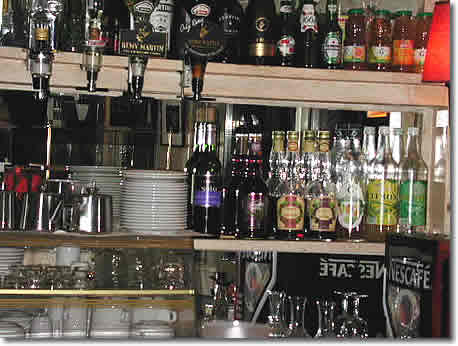
It is a nice little bar with about four high stools. This is the type of bar I like, small and personable. There is young man sitting there. I sit down. I forget exactly how we start talking. I ask if he speaks English; he says un peu. He is the manager of the theatre. I look around at all the posters. Most seem to be American. I spot one of Marilyn Monroe. Then I spot one of a beefed-up young man smoking a cigar. It looks like Arnold Schwarzenegger.
Pointing to it I ask, "That is?".
"A r n o l d," says the manager. I am surprised with the way he says it. He says it as if he is very familiar with Schwarzenegger. But then Schwarzenegger made a lot of bad films. I guess he is well known.
"I don't think he is going to be re-elected," says the manager.
"It's not clear at this point," I say. "He seems to be picking up speed again."
I explain that he took a real beating in the last election when he tried to screw nurses, school teachers, and union workers. Then he crashed his motorcycle and it turned out he did not have a license for it. But not a big problem in the U.S., where the vice president goes hunting without a license and shoots his hunting partner. Just drop some bombs in a village somewhere and people quit thinking about it.
That, however, brought up the topic of the protests over the proposed new work law in France. I asked what he thought. He explained that the unions were very strong in France and that the law was seen as an attempt to weaken them. While the law might help students get work more easily, the overriding concern was to keep the unions strong.
(Since our discussion, the law was enacted, then repealed due to strong protests.)
What a contrast to the United States, where unions are almost dead and the government is doing its best to finish them off.
In part the issue in France was quality of life. It was felt that quality of life, which required stable employment, was more important than aggressive business interests.
"So what is the quality of life shit?" I hear some business person asking.
"Monsieur, just walk out of your office into the street. What do you see?"
"Nothing. I see a street, some cars, some stupid people pacing about."
"Okay, then I will tell you, monsieur. You see les fleurs, you see les boulangeries, you see les cafes, les magazines de vin et tabac , ..."
Moreover, when work gets to be too much you see people freely take a break. They make for a cafe and have a smoke, a glass of wine or beer, or maybe a coffee. And they stay as long as they feel like it. Screw business. Well, now maybe you are not "raising the bar" on anything or observing "best practices" but at least you are happy. Look around the Paris cafe. You see all kinds: working guys in coveralls, business guys in suits, old ladies in hats, students, lovers ... all hanging around taking their time. In the United States this would not go over. Imagine walking off your job every few hours to go to a bar and have a drink? And coming back with alcohol on your breath? Your manager would surely first send you to counseling, as prescribed on the management web site, then, should you continued to take such breaks, put you on probation.
"What do you think you are doing?"
"Uh, having a drink. Want to join me?"
"Not on MicroMacro ... time. How are we going to deliver our deliverables?"
"Uh, the same way we drink our drinkables. One glass at a time. Or maybe we don't. Does it matter?"
"Outrageous. Your'e fired."
We are a sad bunch of people in the United States. We think if we miss a deadline the world is going to fall apart. Fact is, if we missed a few more, the world might start to make some sense. We might begin to see the light or at least a ray of it.
And of course these days, companies put additional pressures on employees by threatening to give their jobs away to foreign workers. Now that is a nice thing to do; it spreads the work around. It might even be seen as an act of charity. But that is not the reason it is done. It is quite simply economics. Consider the extreme form of this "charitable" policy: I have an acquaintance at a company, let us call it MogulMacro Associates, where they only hire foreign workers. U.S. citizens are not allowed to apply. Now how do you think that makes people feel?
"But I know how to do this job. I'm an expert at zml retro algorithmic ..."
"Sorry, George. You're too expensive. We can't afford you."
"But I went to the univesity to learn this stuff. I've spent my whole life in the field. I'm the best."
"Fuck you! Doesn't matter. Get out of this office before I call security."
Not allowed to apply for a job in your own country? How docile have we become?
Now in France the above scenario is not likely. Problems they have but at least not this one. In the U.S., absurd as it sounds, this scenario is common. These days the managers are the tough guys; they are paid extra dough to beat up the workers they manage.
The ticket lady came over, went in back of the bar, and unwrapped two eclairs, one chocolate, the other light brown like cinnamon or nutmeg. She and the manager ate them daintily, washing them down with red wine. I asked if they had whiskey. The manager said he thought so, went in back of the bar, and extracted a bottle of White Label scotch from behind some aperitifs. No Bourbon here. He put a few cubes of ice in a glass and poured. Now if only I had some kind of sugar donut to make my meal complete.
Call all this a complete waste of time if you wish. I call most jobs a waste of time.
I bought some wine, cheese, and bread down at shops on Rue Abbesse, went back to the hotel to rest, then headed back out in the evening.
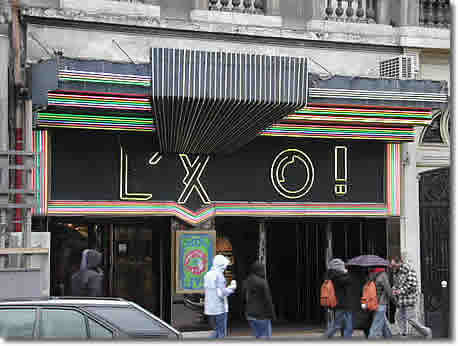
At L'X O! I headed straight for the bar. I was curious if the jerk-ass-manager from last year was still there. He wasn't. I would have enjoyed a little conversation with him. I ordered Jack at the bar and pretty soon there were three or four girls hanging around. One asked if I would buy her a drink.
"Only a drink. Nothing else," I said to clarify the situation.
She asked me where I was from. I said San Francisco. That seemed safe to me.
"In the United States?" she asked.
"Yeah, I guess so."
The other way I approached this delicate matter was to say I was from California. People think of California as being different from the rest of the United States. The have a mostly positive impression of California. But the main thing is to disassociate yourself from the United States and the Bushman.
"You're from where?"
"Fresno. We grow fruits and vegetables in a valley. The valley is hot in summer and the work is hard. We are an honest people...."
"Ou est le Fresno? Aux Etats-Unis? (Where is Fresno? In the United States?)
"Heavens no. It's on an island. It's far away from the Bad Lands. George who? Dick what? Be a good Bush and grab me a couple of Cheneys. I'm hungry."
"You don't look like an island person. Hussein, does cette personne look like an island person?"
"Well, not exactly an island, more of a ..."
But now it is good. France has its problems too. That takes some of the pressure off.
Anyway, the conversation did not go so well with the first girl, which is to say it did not lead to a sale for her, so another took over. Now she spoke remarkably good English. I could forget about my French.
She looked like a student to me. I know the scene from San Francisco, with half the girls who work in the strip clubs students from San Francisco State University.
I guessed right. She was a student from Sorbonne and she was a knock-out looking young woman as well. I asked her what she was studying.
"Nineteenth-century French and American literature," she said.
"Really?" I said. "And how did you get this job?"
Now this I like. She explained to me that she was shy and that she thought the job might help loosen her up.
"Really?" I heard myself saying again. "Really?" does not say much, does it? Might be better to say something like "I'll be damned." At least that gets the idea of surprise across without questioning the veracity of the person with whom you're talking. Nevertheless, I think I said it again.
"Well, I think it might make you less shy about your body but I think you are probably still a shy person."
Shyly, she told me that she had found that so. The conversation might have gone on like this:
"So all this sex stuff doesn't really loosen you up, does it."
"Pas completement." (Not completely.)
"But it's fun?"
"Parfois." (Sometimes.)
"Et parfois pas, pas aussi?" (And sometimes not, right?)
"Oi."
I once had a Korean friend who told me that. She was a really nice young woman. "Sometimes exciting," she said about her job, "but sometimes difficult." I felt sad for her difficult times. She did not deserve it.
Now the conversation might have gone on like this, except that the bartender asked me to pay for the first drink.
"Eighty euros," he said flatly.
"Eighty euros?" I asked. "That is a little expensive for one drink.
"C'est le prix," (That is the price) he said, showing me a card that listed the price of a drink for pour femmes as 80 euros.
"Yes, but that is all I did, buy her a drink."
"N'import pas" (Doesn't matter).
I went silent for awhile and paid him nothing.
We had an unpleasant conversation for awhile, I paid him something, and left. He didn't win; I didn't either. Next time I bring my own bottle.
What an interesting way to overcome your shyness. I wish I had thought of this when I was a young man.
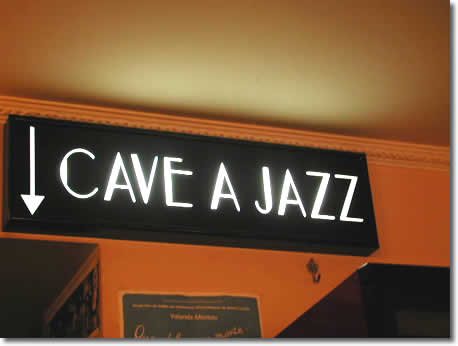
The next day I ventured out several times.
In the early afternoon I went just down the street to Autour
de Midi ... et minuit. I
had noticed the sign the day before and talked with a waiter standing outside
smoking a cigarette. The sign advertised Cave a Jazz, or jazz
in the basement.
I went in for lunch about 3 o'clock in the afternoon. I was hungry and
ordered Filet
de Bouef avec Bernaise.
It came with potatoes and three other vegetables nicely cooked. I took
my time eating. By the time I finished there was just one other couple
in the restaurant. They too were taking their time. They were wrapped in
conversation. They drank a bottle of wine. They had desert and coffee.
She smoked a cigarette. While I was planning the rest of my day and thinking
of other things, I could not help but notice their slow enjoyment of food
and conversation. If I ever have another life to live, I think I will live
it in restaurants having slow lunches, leaving just a little time before
dinner. Then I would move to another place down the the street, start all
over with an aperitif ...
One thing I like about French cooking is the assortment of vegetables that comes with any plate. You get this also at Le Central in San Francisco, a restaurant famous for its lunches. Le Central also serves all day long. Not every restaurant in San Francisco serves all day; that seems to be a tradition of the past. These days many restaurants like to rush you in and out, shut down to prep for the dinner crowd, and generally do anything that maximizes profit. But the best serve all day.
Now at Le Central in San Francisco (photo below, famous waiter-actor Louis Parnell at Le Central) it does not matter what you order, you always get a nice assortment of vegetables. But not every French restaurant in San Francisco honors this tradition. It is an appreciation for the garden, really. If you have been a vegetarian, which I was for some years, you appreciate this. While you may have fallen from "the way," you have not forgotten it.
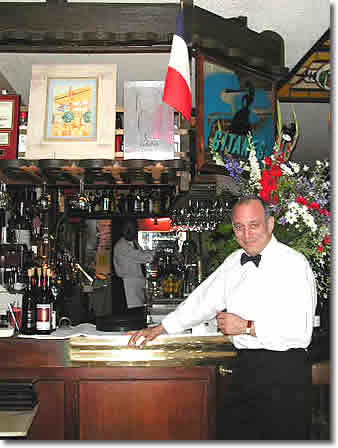
After lunch I took a walk up the hill to the upper part of Rue Lepic. That part of Rue Lepic is quiet. There are a few shops, a few restaurants, some businesses, but it does not have the hustle of lower Reu Lepic or Rue Abbesse. And there are no Giusseppes loitering, art pad in hand, waiting to ambush you.
It is a gray day, the rain is coming down, and I'm just beginning to wonder a little what I'm doing here. Then, in the window of an art gallery I suddenly found myself staring at some paintings. While they reminded me of the posters of masterpieces of the past, they were not posters; they were brand new. I stared at one of a man's face that was composed of little men. It was colorful and fanciful. I was intrigued. These paintings were the opposite of what I had seen the day before at the top of the hill.
While I had not really come to Montmartre to seek out art or paintings—I was more interested in music and food—this stuff was striking. There were two men in the studio talking. They looked like friends. I went inside to get a closer look. For some reason it did not occur to me that this was the studio of the artist. I just assumed it was a gallery with stuff for sale. But inside I soon realized that this was the working studio of the artist. Both were older men, one smiling, chatty, and a little plump, the other with sharp features and gray ruffled hair. The latter had a hand-rolled, brownish cigarette dangling from his lips. The cigarette appeared to have gone out. He looked a little on edge. This I rightfully took to be the artist.
While they talked, I looked at some of the paintings on the walls. They were all signed Andre Martins de Borras. His work reminded me of the work of Anne Bachelier, a French artist represented by the Weinstein Gallery in San Francisco. Both are highly imaginative and fanciful. Bachelier is perhaps more dream-like, while Martins de Borras is highly imaginative but more concrete in the way he expresses himself. But words don't do it when it comes to describing art. I bought a few post cards of painting, asked if they spoke English—"pas du tous" came the answer from the plump gentlemen—and tip-toed out of the gallery.
Back on the street it was still gray and drizzling, but I suddenly experienced an overwhelmingly good feeling, like I had discovered something. Not something that no one else knew about, but rather something I had discovered for myself. Sometimes it takes a bit of prowling to do this. You have to get out, walk around, hunt, and sometime be bummed out, until this happens. When it does, it is worth it. Even if it is something little, at least you found it yourself; you did the leg work to turn it up and it is really "yours."
I went up Rue Lepic a little further, then cut back down to Abbesse. Rue Abbesse is not a famous street as far as I know—at least no one has ever mentioned it to me—but I found it to be one of the most colorful streets in the area. In terms of street life—cafes, tobacs, coffee houses, boulangouries, flower shops—it was packed. I passed Le Nazir, where I was getting my first coffee hit every morning. It's a classic. At La Mascotte, a fancier-than-average cafe, I strolled inside to the bar. There were many bottles in back of the bar and all the brass appeared polished. Curious to know if they made cocktails, I asked if they could do a Negroni. They asked what went into it. I told them gin, Campari, and Vermouth rouge. No problem, they had it all. I asked if they shook cocktails. They did not.
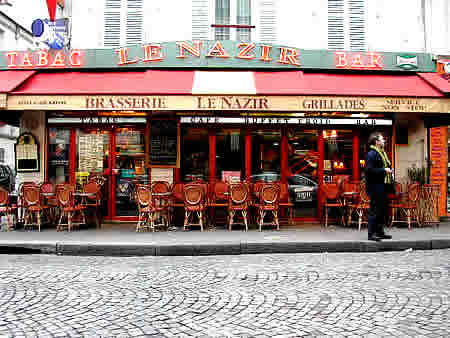
One of the bartenders went to work and soon I was presented with a Negroni in a tall fluted glass, slice of orange inside. Not bad but there was an extra flavor there, almost like coconut, that I could not identify. A drop of Pernod, perhaps?
I had done my standard trick here to communicate. I had first tried French, which usually led to an impasse, then asked, "Parlez-vous Anglais?" The answer is usually "pas du tous" but occasionally" un peu." Here I think it was "un peu." Thereafter we spoke in a mix of English and French. That worked. Or to be honest, they spoke English and so did I except when I knew the French. At least I got some practice.
Now there was a young woman standing near by who, when the bartender went away, asked where I was from. "San Francisco," I said, distancing myself as far as possible from the United States and the Bushman. I was prepared to say, if anyone asked further, that San Francisco was an island in the sea of California.
I have the feeling that she is a student and wants to practice English. Sounds like fun to me but I have really come in just to have a drink.
She tells me that she studied English for six years in school. But her English is very shaky; she does not really speak it. I run into this again and again in France. Apparently it is a requirement to study English in school but unless one has strong motivation to really learn to speak it, it is does not sink in. I'm a little surprised, as I've been told that everyone speaks English in France, but I find this not to be the case. I would say that few really do. Their English is as bad as my French. The people that do speak English are in the service professions where they need to speak it. Like the receptionist at the hotel. She really speaks English, no question.
Still, I find it a lot of fun to speak with someone who is just right on the border. It makes you grapple for understanding; it makes you work to get the point across. And if there really is no point, you don't bother. When you are able to communicate, it comes with a sense of having accomplished something, of having crossed a deep divide. That is satisfying.
The young woman was actually rather shy, I think. Certainly more so than the young woman at L'X O! I had the impression she was pushing herself beyond her normal boundaries just to talk with me. That was nice. Also, I think she loosened up, as did I. Nice too. We did not even need to take off our clothes and have sex. We made contact with our words.
Sometimes little conversations are the best. They are a long conversation in a few words. They are the poetry that might have been prose if more words had been used. Perhaps that was my whole trip right there: crossing the ocean of language and still communicating. If we had had a long conversation, it might have gone like this:
"Bojour, je suis ..." (Hi, I'm ...)
"Bonjour, je suis..."
"Je suis de ..." (I'm from ...)
"Je suis de ..."
"Que pensez-vous a ..." (What do you think of ...)
"Laissez-moi dire ..." (Let me say ...)
See, just a pattern, filling in the blanks. As it was, we skipped all that. As it was I let her know I was from San Francisco, a Beat land of little Bushiness. She let me know with her eyes and a few words that she was shy but curious. Now that is sexy.
I grabbed a few things to eat at Charcuterie Thillerat and went back to my hotel to rest up for the evening.
In the early evening I went down Rue Lepic
to Boulevard Clichy. There is a kind of island there where the street splits
three ways on the other side. I went down Rue Fontaine. I looked for
a bar Le Cine manager had told me about. He described it as a
"gothic" bar. The description was accurate. It was entirely black
inside. He thought it was interesting; I did not. I've seen dozens of similar
places in the U.S. where the music is so loud no one can really talk and
no one really wants to anyway. Hard-looking young men sat in front of glasses
of wine or beer, smoking and saying nothing. Young ladies were either already
on their cell phones or waiting for "important" calls, the idea
being that nothing was important here. The name of the place is KATA,
just in case you want to avoid it. Better go to one of the sex clubs on
Clichy and at least have a conversation.
Which in fact is what I did next. Well, the place was on a back street off of Clichy and I was not initially sure what it was. There was a small bar in the front, then a passage way to a basement in the back.
"Avez-vous le whiskey?" I asked the black woman in back of the bar.
"Oui, monsieur" she said.
She asked where I was from, I said the usual, and we fell into conversation in English. We had initially fumbled around between French and English. She spoke English pretty well, which surprised me. She said she had studied English for five years and she had lived in London. London was where she really learned to speak. That was the difference.
A couple of other ladies were hanging around the bar, one fat who looked like she was pouting, the other with her shoes off picking at her feet. The latter turned out to be the manager. She quit picking her foot and asked if I wanted to buy one of the girls a drink.
"Not now. I will try to come back later," I said. Then I asked the question, "Combien?" (How much?)
"Trente euros," (thirty euros) she said.
This was a bit of an expensive drink. I wondered what came with it. I tipped all three women and left. I liked the black woman. She was flirtatious and friendly. She did not seem to be suffering from shyness.
Later I checked the name. It is the Madison Bar Club, just a block of Clichy. I don't want to tell you how to spend your time, but this is a better way than on the main drag, and it sure beats that smoke-filled black cave called KATA. The main drag is more like an amusement park. Follow your mother's advice and you'll stay out of these places entirely.
"But mom ..."
The following afternoon I dropped by the studio
of Andre Martins
de Barros again.
He was painting and there was a young woman sketching what looked like a
portrait of Andre. Both looked very serious and disciplined. I did not
interrupt but just looked over the post cards. I wanted a few more to take
back with me. I was curious what some of my gallery friends in San Francisco
would think. I got one of a violin that is falling apart on top of a pile
of music books. There are little people standing on top of the violin playing
little violins and two acrobats. I got another of two children in the lap
of a mysterious-looking, god-like mother. They are staring straight ahead
while placing toy soldiers in a book lying open in a field with a mountain
in the background. Both of these are meticulously executed works with
beautiful color; they are lovely to look at but also tell a story that
you can piece together in various ways. That is what makes them intriguing.
All of Andre's work seems to be of this sort. (Painting below: "The Librarian,"
copyright Andre Martins de Borras, used by permission of the painter.)
He reminds me a little of
Brad Noble, a young
artist from Missouri, who works are representational but subject to multiple
interpretation.
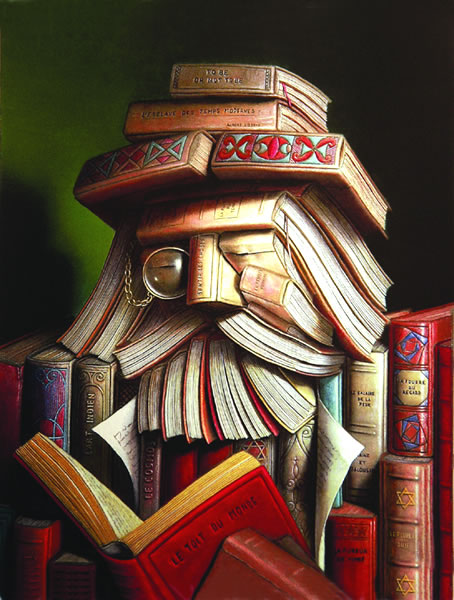
When I had the cards I wanted I walked over to where Andre was working and stood watching. After a few moments he stopped painting and stood up.
"Trente-cinq," he said. I knew he did not speak English, so I just paid for the cards and, indicating the whole gallery with a sweeping gesture, said "Tres bonne." He nodded appreciation. Next time, I thought, I will have French down. I would have loved to talk with him.
I went up the street to a little cafe called Moulin and sat at the end of the bar by the window. A tall thin young woman came over to ask what I wanted.
"Vin rouge," I said. She handed me a list and I ordered one.
She knew "un peu," which she indicates by a quarter inch gap between her thumb and index finger, so I asked her if she knew Andre Martins de Barros. She did and she also likes his work. She sits on a stool in back of the bar by me and we talk a little. Then some other customers come in, order beer, and I look at the cards and finish my wine. It is mid afternoon. I am beginning to enjoy the life here.
A little later I go over to Le Chiron on Rue Abbesse for dinner. I sit on the street but it is warm under the low awning with the heat lamp. One other couple also sits outside. Even though it is raining there are people in the street, and with the lights of all the shops it is very colorful. I order an Americano, which comes in a tall glass, beouf au poiver (pepper steak), and a glass of Chiron vin rouge. The Americano is a stirred cocktail, a little different than you would get in the U.S. There is more fruitiness, I think. The steak comes with fries and salad. It is simple but good. I go back to the hotel and rest until it is late evening. I want to catch the jazz at Autour de Midi, where Paul Vernon and others are playing.
Around 10:30 I head down Rue Lepic to Autour de Midi ... et minuit. (The name of the place, in case you are wondering, is a little joke. It means around lunch time ... and midnight.) It is cold out and I'm bundled up tight with a leather jacket and muffler. Still the cold penetrates.
About mid way down the block I hear jazz, but not coming from the cave at Autour de Midi. It is coming from a cafe called Cafe de 2 Moulins. There is a lot of wild energy in the sound and the cafe is packed. I step inside and work my way over to the bar near where the musicians are set up in the corner. It looks like a jam session. The fixtures are the tenor saxophone player and the bass and drums. The tenor sax player is very good, playing long well-connected overlapping lines with great skill. He looks about thirty-five or so. The other musicians look younger. There is a young man with blond dreadlocks who is sitting in on alto. He is not bad but does not sound very sure of himself. Then a young black man with a tenor sax comes up. He is smoking a cigarette and playing at the same time. He plays with more confidence. But it is the tenor sax player who really has the experience. His sound is that of a mature player who knows exactly how to hit all the notes and weaves his lines among the chord changes, overlapping them, a fast flurry of notes followed by a little restraint, followed by another flurry. He takes long solos that seem to be complete compositions, ending when he has finished what he wants to say. He does not just trail off.
Then I move off down the street to the Cave a Jazz. There is a cover here tonight and the musicians are older and "known." In addition to Paul Vernon on tenor sax, there is Vincent Reneaudineau on trombone, Francis Behr on piano, Jean-Louis Bisson on bass, and Albert Blowinski on percussion.
Now the Cave is partitioned into to two parts. There is the bar on one side, and there is the performance area on the other. I suppose this cuts down on bar noise. I went to the bar, where there is a projection on the far wall of the performance area on the other side, and never left. After a ordering vin blanc, the bartender starts talking to me in perfect English. He is a Mr. Stephen Croce from New York and he is filling in this evening for his friend Christine. He tells me he has been living in Paris for 13 years now and is an actor and singer. He loves it. I tell him about Le Chat Noir and he agrees, I think, that it is nothing unusual now. He writes down a whole list of Jazz places in the city. This is what I have been waiting for. I'm not going to be able to go to them this time; I'm leaving tomorrow. But next time I can hunt them down.
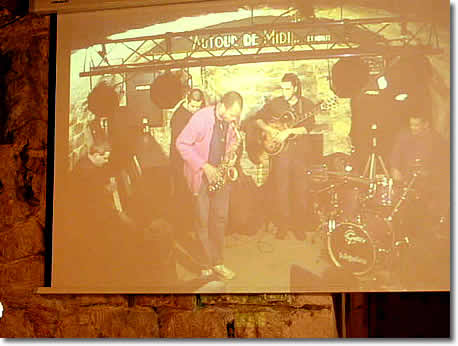
I hear a woman singing now. Stephen tells me she is also from New York. She is singing All the Things You Are, an old jazz classic. But she blows the opening lines, which Stephen points out. I am actually surprised by the amount of American music I'm hearing in Paris. Last night at Le Chat Noir I got there just as Rene Miller was finishing up. He is from the U.S. and has been playing in Paris for 16 years. The restaurant at Autour de Midi was closing at this point and the waiter I had met the night before in the street came down. He is twenty-eight years old and an aspiring actor. We talked about being a waiter and pursuing an acting career. Waiting tables seems to be the perfect job for a young actor in need of money. The job involves a bit of acting, and it also allows you to observe a variety of human nature. If you pay attention to your customers it is educational.
The singer came by the bar, and I told her that All The Things Your Are is a tough one. I was trying to think of the name of another tough one, My One And Only Love, which requires a huge range, but my mind was addled, probably by too many cups of coffee, too many glasses of wine, several cocktail, and more cold than I was used to. The name of the tune went into hiding till I got back to the hotel. Then I found myself humming it.
All The Things You Are? My One And Only Love? Were these songs about Paris, perhaps? It had been a fine few days. I was thawing out, loosening up, and discovering new things, maybe even new ways. It was too early to say. Was I now a sad San Franciscan who was about to leave his heart here? Maybe. Paris is a knock-out. It has so much to offer and you don't have to walk or drive miles to find it. You just walk out your door and you are there. Voici ici. In San Francisco—do I dare call it "The City" now?—you always have to do a little walking. But that is okay. San Francisco has great views. Go away for a bit and you know that. The hills, the bay, the view from Nob Hill, Russian Hill, the Golden Gate. Those are unforgettable. All you need to do is learn to walk around, or occasionally hop a bus or a cable car, and in a few minutes you are there. And the food ain't bad too. The food ain't set in its ways in San Francisco. It is always something new. San Francisco, she ain't going to bore you to death. She's going to demand stuff from you, and not only your money, honey. But Paris? Paris has it down and you walk right into it as soon as you hit the street. I don't have Paris down yet. She's too big, too complex to make such a claim about. And why am I calling Paris a she? But I'm beginning to understand her words and ways and see her charms. It's been a fine few days. Am I falling in love? Who knows? But I'll be back. I'm already planning our next date.
Home | City Notes | Restaurant Guide | Galleries | Site Map | Search | Contact